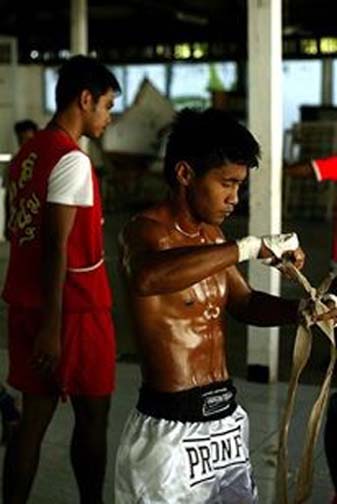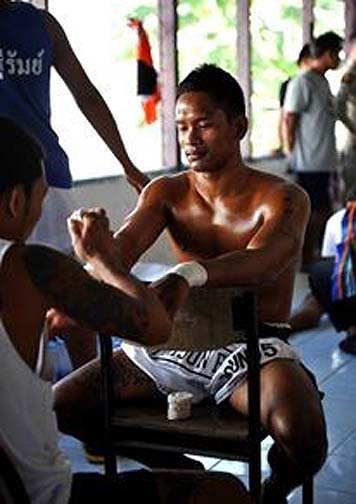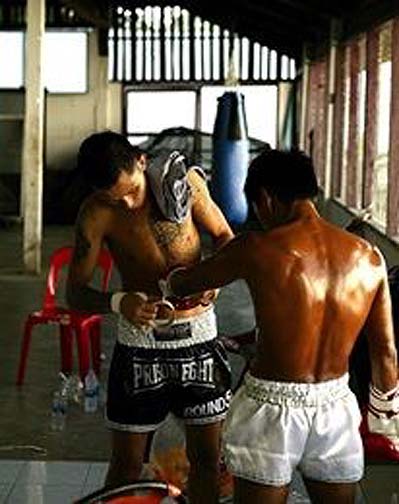Imagine if you will: A dark room teeming with the aroused, free-flowing testosterone of a predominately male crowd of spectators, all eyes riveted on two scantily dressed, hot, sweaty, well-built young men center stage, their bodies locked crotch to crotch in embrace, chests heaving in exertion and excitement, their drenched, revealing shorts plastered to their muscular bodies leaving little to the imagination. Not that you need to rely on your imagination; you’ve seen the tall, mustached performer naked before, his beautifully muscled swimmer’s physique and prodigiously engorged member seared in your memory.
Sound familiar? Been there, seen that? Not so quick there buddy – while this may sound like a typical night on Soi Twilight, it’s not. You’ll have to head a bit northeast from Bangkok’s infamous red light district to take in this male flesh spectacular event. Like about 150 miles. No problemo. Hop into any taxi. While Bangkok’s taxi drivers may be a bit fuzzy on just exactly where the Seafood Market and Restaurant is, everyone in town knows where Khlong Phai Prison. It’s just not a place most touri put on their to-do list. Until now.
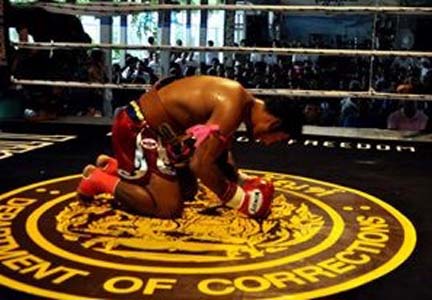
Prison Fight takes cage fighting to a new level – the contestants are convicts who spend their days locked in cages.
Welcome to Prison Fight, Thailand’s answer to the U.S.’s fascination with reality television where scoring a knockout can mean freedom to a convict serving twenty years or more in one of the country’s infamous dungeon-like prisons. Oh, and that gorgeous body and equally gorgeous penis you remember so fondly? Those belong to Sirimongkol Singwancha, former WBC Bantamweight and WBC Super Featherweight
Champion (not to mention Heat Magazine, cover stud of the month) who has been serving a 20-year sentence for drug trafficking.
Dana White, eat your heart out.
Now with five cards under its belt, Prison Fight debuted early last year as a charity event in which local convicts took on muay thai and MMA fighters from around the globe. The farang fight for bragging rights of having whooped a local muay thai boxer on his own turf, the imprisoned fight for a chance at having their sentence commuted. Three of them have already fought their way to freedom by winning their muay thai, boxing, muay boran (without gloves), and blindfolded boxing matches. Including Sirimongkol, who fought and won in both Prison Fight 1 and Prison Fight 3, and who was granted an amnesty last August for his wins after having served four years of his sentence.
Put on by a Thai and Estonian partnership in conjunction with Thailand’s Department of Corrections, Prison Fight – despite its Facebook page’s freakshow-like come-on: “Boxing event in prison – like in movies, but real!” – is part of a program set up in 2010 by the Thai government that sanctions fights at dozens of correctional facilities across the country. The events are orchestrated in much the same way as pro tournaments – all fighters wear regulation gloves and wraps, and every bout is overseen by a seasoned muay thai referee. Not to mention armed guards.
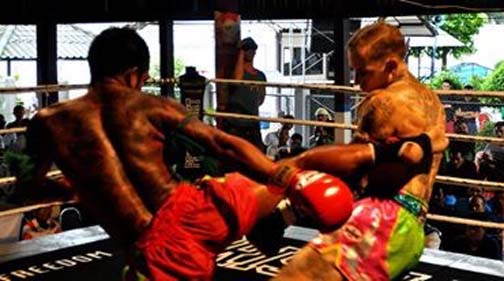
In Prison Fight, Thai convicts take on farang MMA fighters. To date, the Thais have won the majority of bouts.
The tournaments are supposed to promote sport among prisoners and help them stop taking drugs so they are more socially adept upon release. Nathee Chitsawang, director general of Thailand’s Corrections Department believes the events help prisoners develop social skills to make their integration into society easier when they are released. And, supposedly, it makes the prisons look better too. ”We want the world communities to know we are honoring human rights, even in the prison,” he says.
Kirill Sokur, the thirty-something Estonian businessman who teamed up with the Thai Department of Corrections early last year to help stage fights provides the equipment and receives a fee from the Thai government for promoting the bouts. While he doesn’t discount the benefit to promoters – the opportunity to scout top talent from the prisoner pool and the incredible potential for a savvy promoter to represent the bad guy turned good – he also views the program as a knockout win for the prisoners. “Giving these guys a ring and an opportunity to prove themselves in front of the rest of the inmates – and the world, actually – that’s pretty important,” he says.
Aree Chaloisuk, director of Khlong Phai (aka The Warden), too feels the events are a benefit to those prisoners who participate. “From what I have seen, it can improve bad behavior and provides an opportunity for a career for inmates after they leave prison – they can compete instead of becoming criminals again,” he says, adding, “Muay Thai is a strong part of Thai culture.”
As is the idea of prisoners fighting their way to freedom. Back in 1767, thousands of Thai soldiers were taken prisoner by the Burmese after the downfall of Thailand’s then capital of Ayutthaya. While incarcerated the best Thai boxers had to then fight against Burmese boxing champions. The ultimate champion, as legend tells it, was a Thai fighter, Nai Khanomtom, who was forced to fight nine Burmese champions in a row during a festival put on by King Mangra in honor of Buddha. His win so astonished the Burmese king that he granted Khanomtom his freedom – along with two wives – giving birth to a tradition of pardoning outstanding fighters. Based on that historical event, today according to Thai law, there is a chance for prisoners to be amnestied for great sport achievements.
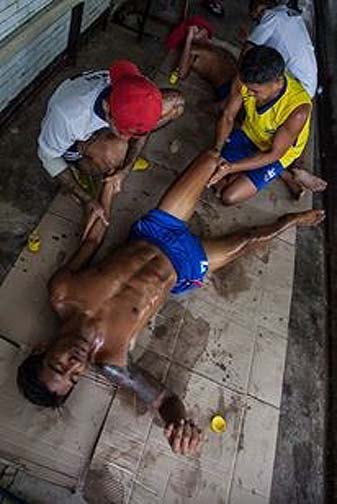
Prison Fight is missing out on a great marketing tool – selling the right to be a corner man would bring in thousands from farang punters.
Under the Prison Fight banner, convicts who win a championship and thereby bring glory to the prison have a realistic shot at having their sentences commuted. Kirill Sokur said this goes for any prisoner regardless of the magnitude of their crime, but was also quick to point out that prisoners are equally judged on their behavior outside of the ring. If an inmate wins a match, his case is referred to the warden of his prison, who then has the option of reducing his sentence by months or even years. To the victor goes not only the spoils, but possibly clemency too.
All but one of the fights have been held at Khlong Phai Prison, one of the country’s largest high-security prisons, which was built in 1999 to relieve the overcrowded prisons in Bangkok. It houses some of the country’s worst drug traffickers, thieves, gang members, and murderers. Not to mention some of the best muay thai boxers in the world. The low quality of life in Thai prisons is well-known and Khlong Phai is no exception. The cells measure approximately 1.5 meters x 3.5 meters, which includes a small bathroom area at the back consisting of a tap and a hole in the floor for a lavatory. There are no chairs or beds in the cells and each holds three to four prisoners, who spend 13 hours a day in their claustrophobically confined space.
Drug use, perhaps not surprisingly, runs rampant. As does fighting. Rape, a common occurrence in U.S, prisons, is practically unheard of however, largely due to inmates being allowed to enter into relationships with ladyboys – who make up a small percentage of the prison population. But only on the condition that they inform the authorities first and agree to an official marriage. Of sorts. Once the ‘marriage’ has been approved they are moved into the same cell. If the relationship eventually comes to an end, the prisoners can seek an official “divorce”. Which may explain why there have been no ladyboy contestants in Prison Fight to date. As well as providing another good reason to fight about.
The next Prison Fight is scheduled for February. Though so far it appears the general public has not been allowed to attend the events – Prison Fight’s web page says cameras and cell phones are not allowed and “all woman have to close their knees and shoulders” so who knows for sure – accreditation as a journalist is pretty basic and easily obtained, and you can apply on Prison Fight’s Facebook page (although I guess if you get busted for that con you may end up with a much better seat than expected). If you think attending a bout would be even more fun as one of the contestants, training is available at the Prison Fight Gym, located opposite Sukhumvit 101/1, a 5 minute walk from the BTS Punnawithi station (on the Bearing Line), on Mondays through Fridays from 11am to 7pm.
Related Posts You Might Enjoy:


